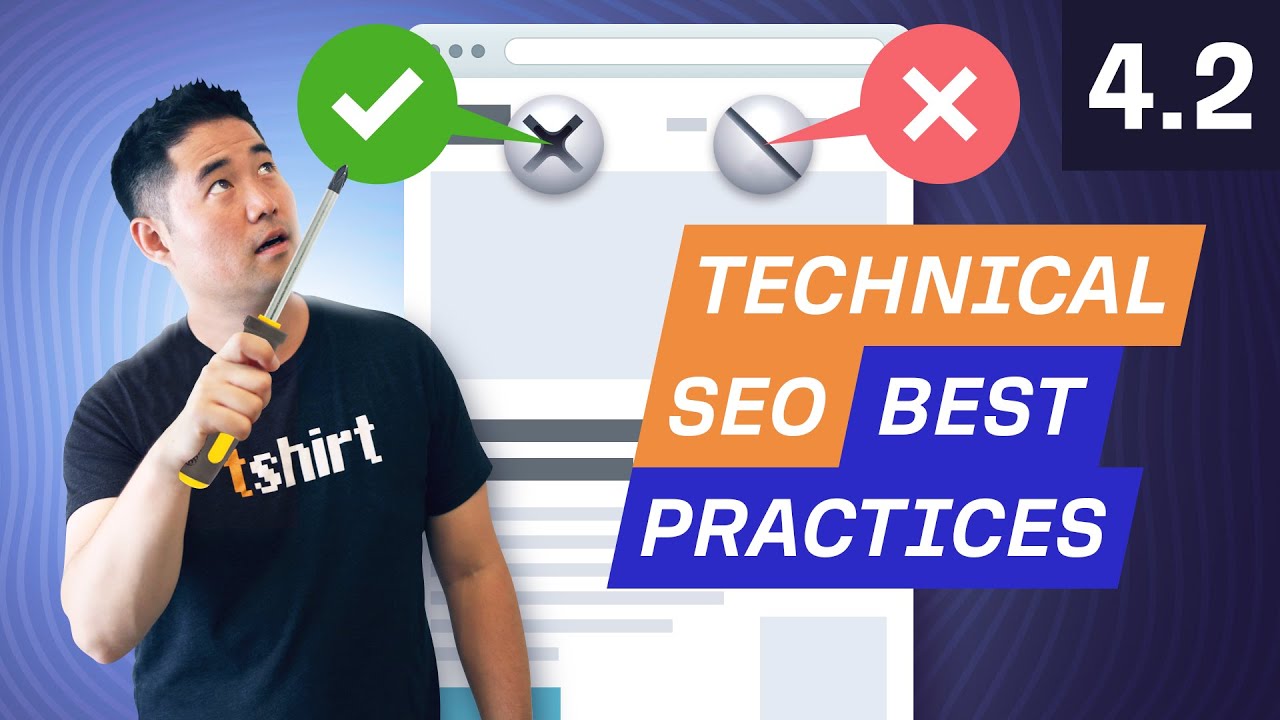For any startup venturing into the digital realm, the question of "Where do we even begin with SEO?" looms large. In a world where online visibility can make or break a young company, Search Engine Optimization(SEO) is a powerful tool to gain a competitive edge.
In this article, we will explore the foundational steps to help startup SEO getting startedand set their course towards enhanced online visibility and businessgrowth. However, the world of SEOcan be complex and ever-changing, leaving entrepreneurs bewildered about where to start.
What Is SEO For Startups?

SEO for startups in under 10 minutes
SEO for startups refers to the practice of optimizing a newly established business's website and online presence to improve its visibility and ranking on search engineresults pages (SERPs). In other words, it involves implementing various strategies and techniques to make the startup's website more search engine-friendly, allowing it to appear higher in search results when users search for relevant keywords or phrases.
The primary goal of SEO for startups is to increase organic traffic to the website, attract the target audience, and ultimately drive business growth. By improving their search engine rankings, startups can gain a competitive edge in the digital landscape and increase their chances of being discovered by potential customers.
SEO strategies for startups may include conducting keyword research to identify relevant and high-traffic keywords, optimizing on-page elements such as titles, meta descriptions, and content, building high-quality backlinksfrom authoritative websites, ensuring mobile-friendliness, and enhancing local search presence if the startup targets a specific geographic area.
How Important Is SEO For A Startup's Success?

Startup Growth with SEO (Secrets from SEO Expert)
SEO is incredibly important for a startup's success in the digital age. Here are some key reasons why SEO plays a vital role in the growth and sustainability of a startup:
- Increased Visibility -In the highly competitive online landscape, getting noticed is crucial. SEO helps startups improve their search engine rankings, making them more visible to their target audience. Higher visibility leads to increased brand exposure and more opportunities to attract potential customers.
- Organic Traffic -Organic search traffic refers to visitors who find a website through search engine results, not through paid advertising. SEO efforts can drive organic traffic to a startup's website, providing a consistent stream of relevant visitors without ongoing advertising costs.
- Cost-Effectiveness -Compared to traditional advertising methods, SEO can be more cost-effective for startups, especially those with limited marketing budgets. While it requires time and effort, the results are long-lasting and continue to benefit the startup over time.
- Credibility and Trust - Websites that rank higher in search results are often perceived as more credible and trustworthy by users. By implementing effective SEO strategies, startups can build authority and trust with their audience, which is essential for gaining customer confidence.
- Targeted Audience -SEO allows startups to target specific keywords and phrases related to their products or services. This ensures that the website attracts relevant traffic, increasing the chances of converting visitors into customers.
- Competitive Advantage -Startups often compete with established companies in their industry. A well-executed SEO strategycan help level the playing field and allow startups to compete with larger competitors on search engines, even with limited resources.
- User Experience-Part of SEO involves optimizing the website's structure and content to improve user experience. A user-friendly website with valuable content leads to higher engagement, lower bounce rates, and increased customer satisfaction.
- Long-Term Investment -SEO is not a one-time effort; it's an ongoing process. However, the benefits of SEO can compound over time. As a startup's online presence grows and search engine rankings improve, the impact of SEO efforts becomes more substantial, leading to sustainable growth.
Keyword Research

Keyword Research Tutorial: From Start to Finish
Keyword research is a fundamental aspect of Search Engine Optimization (SEO) that involves identifying the most relevant and valuable keywords or phrases related to a business's products, services, or content. It is a critical step in the SEO process as it helps businesses understand what their target audience is searching for and enables them to optimize their website and content accordingly. Here's a closer look at the importance and process of keyword research:
Why Is Keyword Research Important?
- Relevance -Keyword research ensures that the content on a website aligns with what users are searching for. Using relevant keywords increases the chances of attracting the right audience to the website.
- Search Volume -Understanding the search volume of specific keywords helps businesses prioritize their content and marketing efforts. High-search-volume keywords indicate significant user interest, while low-search-volume keywords can be more niche but still valuable.
- Competition -Analyzing the competition for specific keywords helps businesses identify opportunities and challenges. Targeting less competitive keywords can be a strategic approach for startups to gain visibility in a competitive market.
- Long-Tail Keywords -Long-tail keywords are longer and more specific phrases that can be valuable for attracting users with specific intent. They often have lower competition and can lead to higher conversion rates.
- Content Optimization-Keyword research guides businesses in creating valuable and relevant content that addresses users' needs, increasing the chances of ranking higher in search results.
The Keyword Research Process
- Brainstorming -Start by brainstorming potential keywords and phrases that are relevant to your business, products, or services. Put yourself in your target audience's shoes and think about what they might search for.
- Keyword Research Tools -Utilize keyword research tools like Google Keyword Planner, SEMrush, Ahrefs, or Moz's Keyword Explorer to expand your keyword list, identify search volumes, and discover related keywords.
- Search Intent-Consider the intent behind specific keywords. Are users looking for information, making a purchase, or seeking local services? Align your keywords with the intent of your content.
- Competitor Analysis -Analyze the keywords your competitors are targeting. This can provide insights into opportunities or gaps in your SEO strategy.
- Long-Tail Keywords -Include long-tail keywords that are more specific and reflect user intent. Long-tail keywords often have lower competition and can attract highly targeted traffic.
- Organize and Prioritize -Organize your keyword list based on relevance, search volume, and competition. Prioritize keywords that align best with your business goals and content strategy.
- Content Creation-Use the selected keywords to guide your content creation efforts. Create high-quality, valuable content that incorporates the keywords naturally and addresses the needs of your target audience.
- Monitor and Update -Keyword research is an ongoing process. Regularly monitor the performance of your chosen keywords and update your strategy based on shifts in user behavior and search trends.
On-Page SEO

On Page SEO Checklist for 2023 | The Only SEO Video You'll Ever Need
On-Page SEO, also known as on-site SEO, refers to the practice of optimizing individual web pages to improve their visibility and ranking on search engine results pages (SERPs). Unlike off-page SEO, which involves external factors like backlinks and social signals, on-page SEO focuses on optimizing the content and HTML elements of a webpage to make it more search engine-friendly. Here are the key aspects of on-page SEO:
Keyword Research And Targeting
On-page SEO begins with thorough keyword research to identify the most relevant and valuable keywords for a specific web page. Once the target keywords are identified, they should be strategically placed in the following elements:
- Title Tags-Craft unique and descriptive title tags that include the target keyword. Keep the title under 60 characters to ensure it displays properly in search results.
- Meta Descriptions-Write compelling meta descriptions that provide a concise summary of the page's content and include the target keyword. Although meta descriptions don't directly impact rankings, they can influence click-through rates.
- Headings (H1, H2, H3, etc.) -Use heading tags to structure the content logically. The H1 tag should generally contain the main keyword, while H2 and H3 tags can be used for subheadings with related keywords.
- URL Structure -Create clean and user-friendly URLs that include the target keyword. Avoid using long strings of random characters in URLs.
- Content - Develop high-quality and relevant content that incorporates the target keyword naturally. Focus on providing valuable information and addressing the user's search intent.
Optimizing Content
Beyond keyword placement, on-page SEO involves optimizing the overall content of a web page. Here are some essential factors to consider:
- Readability and Formatting -Use short paragraphs, bullet points, and relevant images to enhance the readability of the content. This makes the page more user-friendly and encourages visitors to stay longer.
- Internal Linking -Link to other relevant pages within your website using descriptive anchor text. Internal linking helps search engines understand the site's structure and hierarchy.
- Keyword Density -Avoid overusing the target keyword, as keyword stuffing can be detrimental to SEO. Focus on creating natural and informative content.
Optimizing Images
Images play a crucial role in enhancing the user experience and can also contribute to on-page SEO. Optimize images by:
- File Size -Compress images to reduce their file size, ensuring faster page loading times.
- Alt Text -Add descriptive alt text to images, using relevant keywords where appropriate. Alt text helps search engines understand the content of the image and can improve accessibility.
Mobile-Friendliness
With the increasing use of mobile devices for internet browsing, ensuring that your web pages are mobile-friendly is essential. Responsive design and mobile optimization contribute to better user experience and can positively impact SEO.
Page Speed
Page loading speed is a critical factor in on-page SEO. Faster-loading pages are preferred by both users and search engines. Minimize HTTP requests, optimize images, and leverage browser caching to improve page speed.
Technical SEO

Technical SEO Best Practices for Beginners - 4.2. SEO Course by Ahrefs
Technical SEOrefers to the optimization of the technical aspects of a website to improve its search engine visibility and performance. While on-page and off-page SEO focus on content and backlinks, respectively, technical SEOdeals with the behind-the-sceneselements that affect how search engines crawl, index, and rank a website. Here are some key components of technical SEO:
Website Crawling And Indexing
- XML Sitemap -Creating an XML sitemap helps search engines understand the structure of your website and identify all the pages you want them to index. Submit the sitemap to search engines through Google Search Consoleor Bing Webmaster Tools.
- Robots.txt -Use a robots.txt file to instruct search engine crawlers on which pages or sections of your site to crawl and which to avoid. This helps prevent the indexing of duplicate or sensitive content.
Website Speed And Performance
- Page Speed -Optimize your website's loading speed to provide a better user experience and improve search engine rankings. Compress images, enable browser caching, and minimize HTTP requests to speed up page loading times.
- Mobile-Friendly Design -Ensure that your website is responsive and mobile-friendly. With the increasing use of mobile devices, mobile compatibility is a crucial ranking factor for search engines.
Website Structure And Hierarchy
- URL Structure -Create clean, descriptive, and SEO-friendly URLs that include relevant keywords and make it easy for both users and search engines to understand the content of the page.
- Internal Linking -Use internal links to connect pages within your website. This helps search engines navigate and understand the relationship between different pages, improving overall website crawlability.
Duplicate Content And Canonicalization
Canonical Tags -Use canonical tags to indicate the preferred version of a page when you have duplicate or similar content. This prevents search engines from considering duplicate pages as separate entities and consolidates the ranking signals to the preferred version.
Structured Data And Schema Markup
Schema Markup-Implement schema markup on your website to provide structured data that helps search engines understand the content and context of your pages better. This can lead to rich snippets in search results, enhancing visibility and click-through rates.
SSL Security And HTTPS
HTTPS - Secure your website with an SSL certificate to enable HTTPS. Besides enhancing website security, HTTPS is a ranking factor, and search engines give preference to secure websites in their rankings.
404 Errors And Redirects
- 404 Errors -Regularly monitor and fix 404 errors (page not found) to improve user experience and prevent broken links.
- 301 Redirects- Use 301 redirects to redirect users and search engines from old or deleted pages to relevant and updated pages, preserving link equity and preventing 404 errors.
Local SEO

The Complete Local SEO Checklist for 2024
Local SEO is a specialized branch of Search Engine Optimization that focuses on optimizing a website to be more visible in local search results. It is essential for businesses that serve a specific geographic area or have physical locations. Local SEO aims to help businesses attract local customers and increase foot traffic to their brick-and-mortar stores. Here are the key components of local SEO:
Google My Business (GMB) Optimization
- Claim and verify your Google My Business listing for each physical location. Complete all the required information, including business name, address, phone number (NAP), hours of operation, website URL, and category.
- Add high-quality images of your business, products, and services to your GMB profile. Visual content can attract more potential customers.
Local Citations
- Ensure that your business information (NAP) is consistent across all online directories, local business listings, and social mediaplatforms. Inaccurate or inconsistent information can confuse search engines and customers.
- Register your business on popular local directories such as Yelp, YellowPages, Bing Places, and Apple Maps. This increases your online visibility and local search presence.
Customer Reviews
- Encourage satisfied customers to leave positive reviews on your Google My Business profile and other review platforms. Positive reviews can improve your local search rankings and build trust with potential customers.
- Respond promptly and professionally to both positive and negative reviews. Engaging with customers shows that you value their feedback and are attentive to their needs.
Local Keyword Targeting
- Include location-specific keywords in your website content and meta tags to signal to search engines that your business is relevant to local searches. For example, use phrases like "best coffee shop in [city]" or "restaurant near me."
- Create location-specific landing pages for each physical location or service area. These pages can target local keywords and provide specific information tailored to each location.
Local Link Building
Build relationships with other local businesses and organizations to earn local backlinks. Local link buildingcan improve your local authority and prominence in search results.
Mobile Optimization
With the increasing use of mobile devices for local searches, ensure that your website is mobile-friendly and loads quickly on smartphones and tablets.
Geotagging
Add geotags to your website's images to provide location data to search engines. Geotagging can be especially useful for businesses with multiple physical locations.
Link Building
Link building is a crucial aspect of Search Engine Optimization (SEO) that involves acquiring hyperlinks from other websites to your own. These inbound links, also known as backlinks, are like "votes of confidence" from other websites, indicating to search engines that your content is valuable and worth referencing. Link building is a vital factor in determining a website's authority and ranking in search engine results. Here's a closer look at link building and its importance:
Importance Of Link Building
- Search Engine Rankings -Search engines, such as Google, consider backlinks as one of the top ranking factors. Websites with a higher number of quality backlinks from authoritative sources tend to rank higher in search results.
- Website Authority -Backlinks from reputable and trustworthy websites contribute to your website's overall authority and credibility. This can positively impact your website's ability to attract more organic traffic.
- Discoverability and Crawling - Backlinks help search engine crawlers discover and index your website's pages more efficiently. They create pathways for crawlers to navigate through different parts of your site.
- Referral Traffic -Backlinks can drive direct referral traffic to your website. When users click on a backlink from another site, they are directed to your site, potentially increasing the number of visitors.
Types Of Backlinks
- Natural Backlinks -These are earned organically when other websites link to your content because they find it valuable and relevant. Natural backlinks are the most desirable and carry the most weight with search engines.
- Outreach Backlinks - These are acquired through manual outreach to other websites, asking them to link to your content. Outreach can involve guest posting, content collaboration, or other forms of relationship building.
- Self-Created Backlinks -These are links that you add to forums, blog comments, or other online platforms yourself. Search engines are less likely to value self-created backlinks as they can be seen as manipulative.
Qualities Of Quality Backlinks
- Relevance -Backlinks from websites in a related industry or niche are more valuable as they indicate that your content is relevant to your target audience.
- Authority -Backlinks from authoritative and well-established websites carry more weight and influence in improving your website's credibility and ranking.
- Diversity -A diverse link profile with backlinks from different sources and domains is more beneficial than a concentration of links from a single website.
Link Building Best Practices
- Create High-Quality Content -Producing valuable and shareable content is the foundation of link building. High-quality content naturally attracts backlinks from other websites.
- Guest Posting -Contribute guest posts to reputable websites in your industry. This can not only earn you backlinks but also enhance your brand's visibility and authority.
- Networking and Relationship Building -Build relationships with other websites and influencersin your industry. Genuine connections can lead to natural backlinks and collaboration opportunities.
- Competitor Analysis -Analyze your competitors' backlink profiles to identify potential link-building opportunities. Look for websites that are linking to your competitors and reach out to them as well.
Monitor And Analyze

Track SEO Metrics and Rank Faster on Google [Complete Guide]
Monitoring and analyzing your SEO efforts are crucial for understanding the effectiveness of your strategies and making data-driven decisions to improve your website's performance. SEO is an ongoing process, and regular monitoring allows you to identify areas that need improvement and capitalize on successful tactics. Here's how toeffectively monitor and analyze your SEO efforts:
Use Google Analytics
Google Analyticsis a powerful tool that provides valuable insights into your website's traffic, user behavior, and conversion rates. Set up Google Analytics on your website to track important metrics such as:
- Organic Traffic -Monitor the amount of traffic coming from search engines. Keep an eye on changes in organic traffic over time.
- Bounce Rate -Assess the percentage of users who leave your website after viewing only one page. A high bounce rate may indicate issues with your content or user experience.
- Conversion Rate -Track conversions, such as form submissions, sign-ups, or purchases. Understanding your conversion rate helps measure the effectiveness of your SEO efforts in driving desired actions.
Google Search Console
Google Search Console provides essential data about your website's presence in Google's search results. Use it to:
- Submit Sitemaps -Submit your XML sitemap to Google Search Console to ensure that all your pages are indexed and crawled.
- Check Indexing Status -Monitor how many pages from your website are indexed by Google. If you notice a drop in indexed pages, investigate potential issues.
- Search Queries-Analyze the search queries that are driving traffic to your website. Identify high-performing keywords and opportunities to improve rankings for relevant queries.
Keyword Performance
Regularly review how your target keywords are performing. Track their rankings and changes over time using tools like SEMrush, Ahrefs, or Moz. Analyze keyword data to adjust your content strategy and identify new opportunities.
Backlink Analysis
Monitor your backlink profile to ensure you're acquiring quality and relevant backlinks. Tools like Majestic, Ahrefs, or Moz can help you analyze your backlinks and identify potentially harmful or low-quality links that need to be disavowed.
Competitor Analysis
Keep an eye on your competitors' SEO efforts. Analyze their keyword rankings, backlink profiles, and content strategies. Understanding your competitors can provide insights into potential opportunities and areas where you can outperform them.
Website Audits
Conduct regular website audits to identify technical issues that may impact your SEO performance. Tools like Screaming Frog, Sitebulb, or Lighthouse can help you discover issues like broken links, slow loading times, or missing meta tags.
A/B Testing
Implement A/B tests for different elements of your website, such as title tags, meta descriptions, or page layouts. A/B testing helps you understand which variations perform better and make data-driven improvements.
People Also Ask
What Are Some Effective SEO Strategies For Startups On A Budget?
Startups with limited budgets can still implement effective SEO strategies. Some cost-efficient approaches include conducting thorough keyword research to target less competitive but relevant keywords, creating high-quality and shareable content, building local citationsand backlinks through networking, and utilizing free SEO tools and resources available on the web.
How Long Does It Take For SEO Efforts To Show Results For Startups?
SEO is a gradual process, and the time it takes to see results can vary based on various factors, such as the competitiveness of the industry, the current state of the website, and the effectiveness of the SEO strategies. Generally, startups can start seeing some improvements in rankings and traffic within a few months, but significant results may take six months to a year or more of consistent effort.
Should Startups Focus On Local SEO?
Yes, startups should prioritize local SEO, especially if they have a physical presence or target a local audience. Local SEO helps businesses appear in local search results, making it easier for potential customers in the vicinity to find and engage with the startup. Creating and optimizing a Google My Business profile, obtaining local citations, and encouraging customer reviews are crucial steps to enhance local SEO for startups.
Conclusion
Embarking on an SEO journey for a startup may seem like a daunting prospect, but with the right approach and a solid foundation, it becomes a manageable and rewarding endeavor. By grasping the fundamental principles, conducting keyword research, optimizing on-page elements, addressing technical aspects, focusing on local SEO, and building quality backlinks, startups can position themselves for success in the digital world.
Remember, SEO is an ongoing process, and staying committed to continuous monitoring, analysis, and adaptation will yield long-term dividends in the form of increased visibility, organic traffic, and, ultimately, thriving business prospects. So, take that first step, embrace the learning curve, and let SEO propel your startup toward greater heights in the digital landscape.